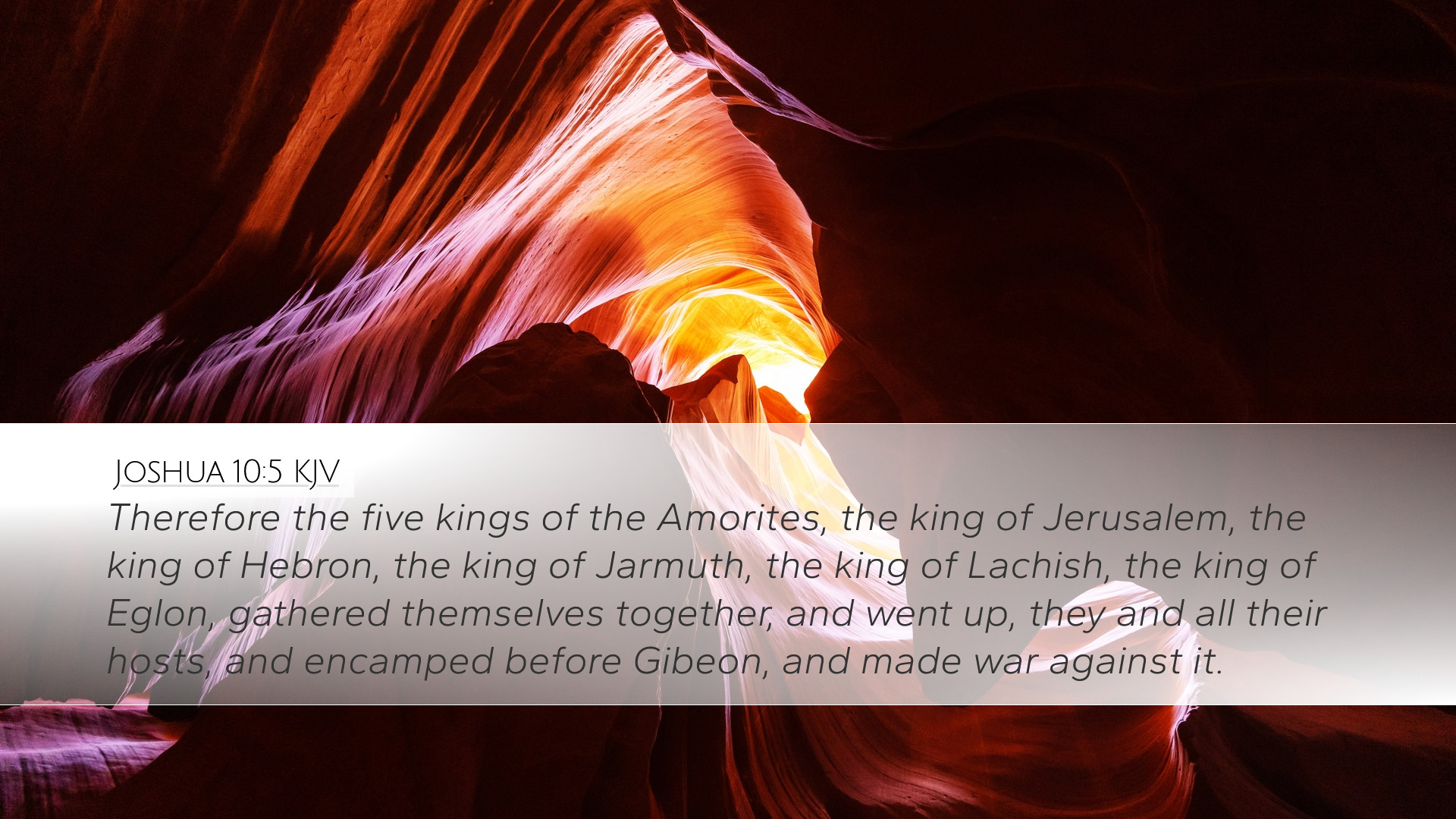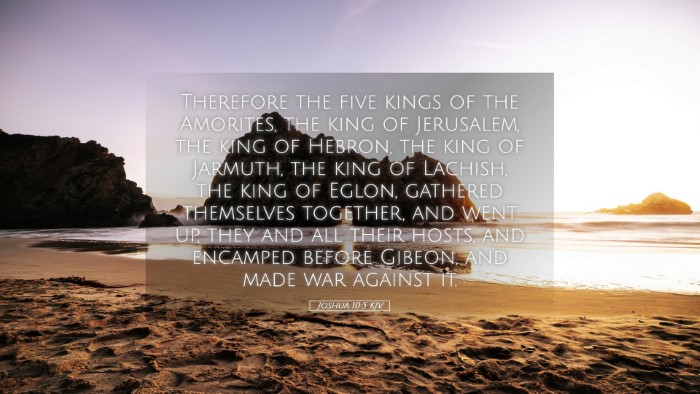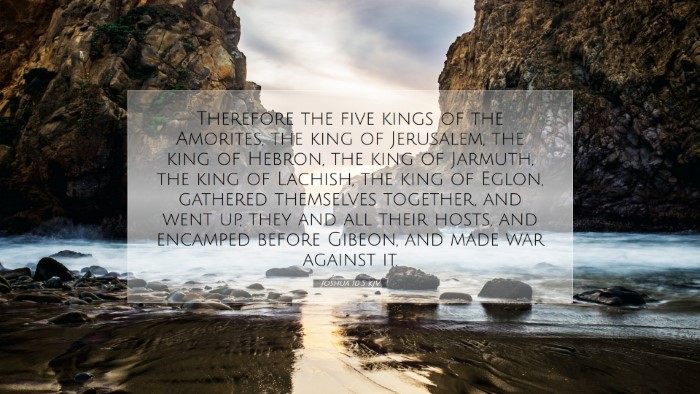Commentary on Joshua 10:5
Verse: "Therefore the five kings of the Amorites, the king of Jerusalem, the king of Hebron, the king of Jarmuth, the king of Lachish, and the king of Eglon gathered together and went up; they and all their armies encamped before Gibeon and made war against it."
Introduction
This verse introduces a significant military conflict in the historical narrative of Joshua. The alliance of five kings against Gibeon reflects the geopolitical tensions during Israel's conquest of Canaan. Commentaries from Matthew Henry, Albert Barnes, and Adam Clarke provide valuable insights into the historical context, spiritual applications, and theological implications of this event.
Historical Context
The formation of a coalition of Amorite kings signifies a desperate reaction to the Israelite conquest, particularly following the miraculous event of the fall of Jericho and the subsequent victories the Israelites experienced. Gibeon's decision to ally with Israel rather than face destruction is a pivotal moment in this narrative, showcasing the larger themes of God's sovereignty and judgment over the nations.
- Matthew Henry: Emphasizes the audacity and strategic thinking of the Gibeonites, who sought to align themselves with Israel for survival against the other Amorite cities. This move was based on their belief in the power of the God of Israel.
- Albert Barnes: Notes the significance of the specific kings named, indicating the threat they posed to Israel's mission. The five kings symbolize the collective opposition against God's plan for His people.
- Adam Clarke: Highlights the historical alliances and rivalries among the Canaanite city-states, illustrating the complexity of the conquest as more than a simple military campaign but as a clash of spiritual ideologies.
Theological Implications
This verse underlines the theological themes of divine assistance, judgment, and the fulfillment of the promises made to Israel. The opposition faced by Gibeonities and Israel not only serves as a backdrop for military conflict but also emphasizes God's protective providence over His people as they enter the Promised Land. The following points elaborate on these themes:
- God's Sovereignty: The gathering of the five kings illustrates God’s control over the events surrounding Israel’s conquest. Despite the hostile environment, God's purpose prevails (Henry).
- Judgment on the Nations: The opposition from the Amorite kings signifies God’s judgment against nations that oppose His chosen people. The conquest symbolizes a divine reckoning for past sins (Barnes).
- Alliance and Betrayal: Gibeon’s choice to ally with Israel reflects a deeper understanding of God’s authority. This act showcases a moment of faith against fear, inviting other nations to recognize God’s power (Clarke).
Military and Strategic Insights
The military response of the five kings is indicative of the broader struggles faced in ancient warfare. Their unified strategy aimed to quash Israel's influence, yet it reveals a misjudgment of the power of Israel’s God:
- Coalition Warfare: As identified by Clarke, the coalition of these kings signifies a common threat posed by Israel. Ancient Near Eastern states often formed alliances in the face of powerful adversaries, a tactic that would eventually be their undoing.
- Fear as a Weapon: Barnes notes that the fears of the Canaanite kings stemmed from the terrifying reputation of the Israelite conquests, leading them to attack those they considered potential traitors, which reflects the desperation of their cause.
- Tactical Errors: Henry reasons that the decision to march against Gibeon was ultimately a tactical error, as it drew the ire of a more powerful force (the Israelites), showing how human strategies can fail in the light of divine purposes.
Spiritual Applications
The events surrounding Joshua 10:5 offer significant spiritual lessons for believers today:
- Relying on God's Strength: Just as Gibeon relied on Israel, believers are reminded to seek God's strength when facing overwhelming odds. It encourages reliance on divine providence in challenging situations.
- Understanding Spiritual Warfare: The unity of the five kings symbolizes the spiritual battles believers face against various adversaries. It serves as a reminder that opponents of God’s purpose will unite, yet victory belongs to the Lord.
- Faith in Unlikely Alliances: The Gibeonites’ strategic alliance teaches that God can use unexpected means to fulfill His plans. It encourages believers to look beyond conventional wisdom and recognize the power of faith-based actions.
Conclusion
Joshua 10:5 serves as a pivotal verse in understanding the challenges faced by Israel during their conquest of Canaan. By interpreting the actions of the Amorite kings, Gibeonites, and the overarching role of divine intervention, we appreciate the historical narrative’s richness. The insights gleaned from prominent commentators underline not only the thrilling historical account but also its relevance for contemporary faith. As pastors, students, and theologians explore this passage, they are encouraged to delve deeply into the themes of God’s sovereignty, human alliances, and the perpetual nature of spiritual warfare.


